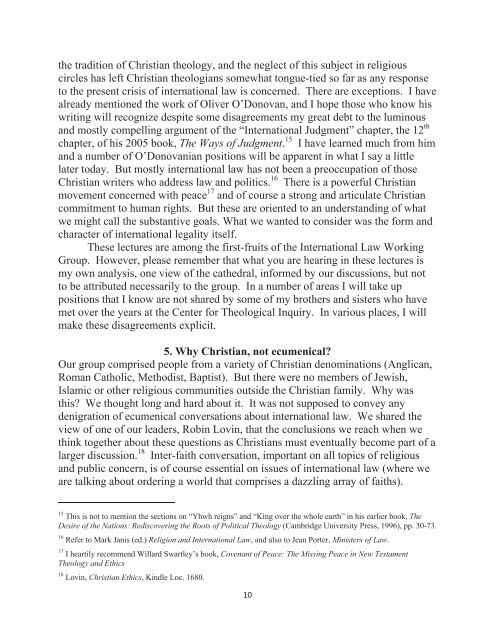International Legal Evangelism: Intelligence, Reconnaissance & Missions
International Legal Evangelism: Intelligence, Reconnaissance & Missions
International Legal Evangelism: Intelligence, Reconnaissance & Missions
Create successful ePaper yourself
Turn your PDF publications into a flip-book with our unique Google optimized e-Paper software.
the tradition of Christian theology, and the neglect of this subject in religious<br />
circles has left Christian theologians somewhat tongue-tied so far as any response<br />
to the present crisis of international law is concerned. There are exceptions. I have<br />
already mentioned the work of Oliver O’Donovan, and I hope those who know his<br />
writing will recognize despite some disagreements my great debt to the luminous<br />
and mostly compelling argument of the “<strong>International</strong> Judgment” chapter, the 12 th<br />
chapter, of his 2005 book, The Ways of Judgment. 15 I have learned much from him<br />
and a number of O’Donovanian positions will be apparent in what I say a little<br />
later today. But mostly international law has not been a preoccupation of those<br />
Christian writers who address law and politics. 16 There is a powerful Christian<br />
movement concerned with peace 17 and of course a strong and articulate Christian<br />
commitment to human rights. But these are oriented to an understanding of what<br />
we might call the substantive goals. What we wanted to consider was the form and<br />
character of international legality itself.<br />
These lectures are among the first-fruits of the <strong>International</strong> Law Working<br />
Group. However, please remember that what you are hearing in these lectures is<br />
my own analysis, one view of the cathedral, informed by our discussions, but not<br />
to be attributed necessarily to the group. In a number of areas I will take up<br />
positions that I know are not shared by some of my brothers and sisters who have<br />
met over the years at the Center for Theological Inquiry. In various places, I will<br />
make these disagreements explicit.<br />
5. Why Christian, not ecumenical?<br />
Our group comprised people from a variety of Christian denominations (Anglican,<br />
Roman Catholic, Methodist, Baptist). But there were no members of Jewish,<br />
Islamic or other religious communities outside the Christian family. Why was<br />
this? We thought long and hard about it. It was not supposed to convey any<br />
denigration of ecumenical conversations about international law. We shared the<br />
view of one of our leaders, Robin Lovin, that the conclusions we reach when we<br />
think together about these questions as Christians must eventually become part of a<br />
larger discussion. 18 Inter-faith conversation, important on all topics of religious<br />
and public concern, is of course essential on issues of international law (where we<br />
are talking about ordering a world that comprises a dazzling array of faiths).<br />
<br />
15 This is not to mention the sections on “Yhwh reigns” and “King over the whole earth” in his earlier book, The<br />
Desire of the Nations: Rediscovering the Roots of Political Theology (Cambridge University Press, 1996), pp. 30-73.<br />
16 Refer to Mark Janis (ed.) Religion and <strong>International</strong> Law, and also to Jean Porter, Ministers of Law.<br />
17 I heartily recommend Willard Swartley’s book, Covenant of Peace: The Missing Peace in New Testament<br />
Theology and Ethics<br />
18 Lovin, Christian Ethics, Kindle Loc. 1680.<br />
<br />
10

















